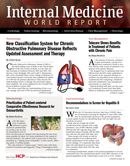Publication
Article
Internal Medicine World Report
Is Time to First Morning Cigarette a Good Marker of Lung Cancer Risk?
Author(s):
Using the metric of time to first cigarette after waking was found to help improve efficiency and reduce false-positive detection in lung cancer screening, a new case-control study suggests.

Using the metric of time to first cigarette after waking (TTFC) was found to help improve efficiency and reduce false-positive detection in lung cancer screening, a new case-control study suggests.
Fangyi Gu, ScD, MD, of the Division of Cancer Epidemiology and Genetics of the National Cancer Institute, and colleagues examined the association between TTFC and lung cancer using logistic regression and estimated lung cancer incidence of levels of TTFC and intensity, duration, and pack-years using absolutely risk regression. The researchers followed 3249 ever-smokers (1812 case subject; 1437 controls) from a population-based study in Italy. The study was published in the July 2014 issue of the Journal of the National Cancer Institute.
Compared with smokers with TTFC greater than 60 minutes, the lung cancer odds ratios (OR) for TTFC of 31 to 60 minutes, 6 to 30 minutes, and 5 or fewer minutes (by increasing dependency) were 2.57% (95% confidence interval [CI] = 2.03-3.26), 2.27 (95% CI, 1.79-2.88), and 3.50 (95% CI, 2.64-4.64), respectively (Ptrend <.0001).
The average lung cancer incidence rates for smokers of 1 to 10, 11 to 20, 21 to 30, and more than 30 cigarettes per day were consistently higher among smokers with TTFC of 60 or fewer minutes versus more than 60 minutes.
The researchers concluded that lung cancer risk increases with shorter TTFC; thus the nicotine-dependency measure of TTFC increases lung cancer risk stratification beyond standard measures of smoking. Assessing TTFC may improve lung cancer risk prediction and can potentially be useful in lung cancer screening and smoking cessation programs.





